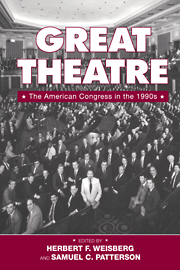Book contents
- Frontmatter
- Contents
- Figures and Tables
- Preface
- Contributors
- Introduction
- Congress and Its Audience
- Congress at Play
- 5 Directing 535 Leading Men and Leading Ladies: Party Leadership in the Modern Congress
- 6 Little Theatre: Committees in Congress
- 7 The Unfolding Drama: Party and Ideology in the 104th House
- Congress and Other Actors
- Conclusion
- References
- Index
7 - The Unfolding Drama: Party and Ideology in the 104th House
Published online by Cambridge University Press: 20 January 2010
- Frontmatter
- Contents
- Figures and Tables
- Preface
- Contributors
- Introduction
- Congress and Its Audience
- Congress at Play
- 5 Directing 535 Leading Men and Leading Ladies: Party Leadership in the Modern Congress
- 6 Little Theatre: Committees in Congress
- 7 The Unfolding Drama: Party and Ideology in the 104th House
- Congress and Other Actors
- Conclusion
- References
- Index
Summary
In 1994 the Republican Party in the U.S. House of Representatives came in from forty years in the barren desert of minority status and assumed the mantle of majority party. For four decades no Republican had chaired a House committee or brought the House to order with the Speaker's gavel. Legislative victories were dependent upon an alliance with disaffected Democrats, who constituted a conservative minority in an otherwise liberal party.
Even Ronald Reagan's victory in 1980, which was heralded as a Republican revolution, did not produce a Republican majority in the House. Contrary to what the Founders would have predicted, the Republicans took the Senate instead. This was the chamber designed to resist flash mass movements, with only a third of its members chosen in any election. It appeared that the linkage of incumbency and electability would keep the Democrats in the House majority, absent a sea change in American politics (Jacobson 1990b).
It is no small wonder that center stage in the theatre of American politics should be captured by the new Republican majority in the House of Representatives. It dominated that stage, albeit with a strong supporting cast assembled by victories in a variety of elective offices including a new Republican majority in the Senate, eleven more Republican governors, and Republican ascendancy in nearly one in five state legislative chambers. House Speaker Newton Leroy Gingrich of Georgia charged the new Republican majority in 1995 to fulfill its Contract with America: increase the power of the people and diminish the role of government.
- Type
- Chapter
- Information
- Great TheatreThe American Congress in the 1990s, pp. 152 - 172Publisher: Cambridge University PressPrint publication year: 1998

